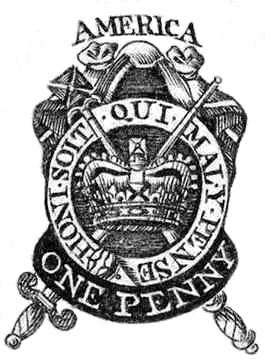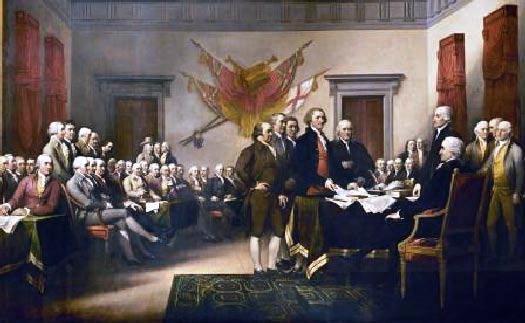History of the first 13 Colonies and how they became the United States The colonization of America and the fascinating events that led colonists and patriots down the Road to Revolution
Reaction to the Stamp Act
In the American colonies the reaction to the 1765 Stamp Act was greeted in America by an outburst of denunciation. Unlike previous Acts and Taxes imposed by the British on the colonies the Stamp Act effected everyone. The new England, Middle and Southern colonies were all equally effected by the Stamp Act. For the first time the colonists were united in a common cause against the imposition of taxes by the British. Facts about the 1765 Stamp Act
The 1765 Stamp Act was imposed on the American colonists to raise revenue by a duty (tax), in the form of various stamps of different denominations, on all newspapers and legal or commercial documents. The documents subject to the Stamp Tax included newspapers, liquor licences, certificates, diplomas, contracts, legal documents, calendars. almanacs, wills, Bills of Sale and Licences - the Stamp Act effected everyone in the colonies. | | 
Stamps showing that the Stamp Act had been paid |
Implementation of the Stamp Act
The Stamp Act was passed on February 17 and received Royal Assent on 22 March 1765. The Stamp Act was to take effect on November 1, 1765. The American colonists had seven months to think about the Act before it took effect... Reaction to the Stamp Act and then the Quartering Act...
Two days later on March 24, 1765 the Quartering Act was passed. The Quartering Act required the colonies to provide housing, food and drink to an additional 40,000 British troops in the American colonies. The Stamp Act and the Quartering Act, combined with the British policies of Mercantilism and their Reversal of Salutary Neglect, added fuel to the fire. The additional troops formed a 'standing army' in America to protect the borders of the colonies and also to help to collect taxes from the colonists - it was a British show of force. Reaction to the Stamp Act - the Merchant's Boycotts
The first reaction to the Stamp Act was led by the Merchants and their wives. The Boston Merchants had previously mounted tax protests in 1764 which were effectively boycotts of many British 'finished goods' that had to be imported from England. These boycotted goods had included clothing such as satins, lace and ruffles. The boycott protest was a good idea as it hit British trade and was totally legal. The Stamp tax was aimed at domestically produced and consumed items (all documents). The merchants viewed the British regulation of trade as legal, but the imposition of internal taxes was perceived to be illegal. Bring on the lawyers... Reaction to the Stamp Act - the Lawyers
The incensed reaction to the Stamp Act from the lawyers were fully understandable. Every legal document was subject to a Stamp Tax. Their very profession was also taxed - the highest tax amounting to £10 had been applied to Attorney Licences. And college and university students were also effected via Diplomas and Certificates. These high taxes were were seen as deliberate ploys to limit the growth of a professional class in the American colonies, reducing the opportunities of colonists and their reducing their levels of independence. The politicians became involved...

Federal Hall, New York
Seat of Congress
Reaction to the Stamp Act - the Politicians
The reaction to the Stamp Act from the politicians varied from the majority who took a cautious approach in airing their grievances to the British parliament to the patriots who favored a much stronger plan of action. Arguments against the the Stamp Act were distributed from assembly to assembly in the form of "circulars" and Patrick Henry introduced seven resolutions against the Stamp Tax in the Virginia House of Burgesses. The Stamp Act Congress was summoned by the politicians and attended by representatives of nine of the colonies to discuss their grievances and protest against the measures proposed in the Act by the British king and Parliament. It was the first time that politicians from New England, the Middle and Southern colonies had united in a common cause. The reaction of the politicians was to present grievances and protests relating to the administration of royal governors and British taxation without their consent. Some of the politicians were English aristocrats who saw the actions of these politicians as "seditious, factious and republican." But the opposition to the Stamp Act and the Quartering Act, grew steadily all through the summer of 1765... Reaction to the Stamp Act - the People of America
The wealthy merchants, the lawyers and the politicians were a world apart from the vast majority of colonists. The ordinary people had taken little part in public affairs of the American colonies. The violent reaction to the Stamp Act by the ordinary colonists, the people of America, was therefore unexpected by both Americans and the British. Throughout the colonies came a rise of protests. The men and women of the Northern, Middle and Southern colonies were furious. The items that required Stamps and therefore were being taxed included Newspapers, wills, marriage licences, contracts and diplomas. Playing cards and dice were also required to have a stamp, so gambling was to be indirectly taxed. There was also a requirement for liquor licences, so alcoholic drinks were to be indirectly taxed. And to add insult to injury the Quartering Act required American colonists to provide food and shelter to British troops were were going to enforce the Act. The Reaction to the Stamp Act broadened the notion of liberty and self-government far beyond what Great Britain had ever envisioned... Reaction to the Stamp Act - the Daughters and Sons of Liberty
The Stamp Act effected everyone - so the colonists believed that everyone should have a say in these taxes. But many people were excluded from the right to vote for colonial assemblymen, including artisans, mechanics, laborers and women. The protests spread - committees and societies were formed pledging to resist the Stamp Act to the bitter end. These popular societies were known as the Daughters of Liberty and the Sons of Liberty. These people despised the 'lame' protests of the elite colonists - they favored more extreme measures... Reaction to the Stamp Act 1765 - the Stamp Act Riots
The summer of 1765 was relatively quiet in terms of protests. They could not refuse to obey the law in relation to the Stamp Act because it would not go into effect until November. Resolutions were passed and committees were formed. Things changed in August when the names of the stamp distributors were published. In every one of the colonies the people visited the stamp officers and pressured them to resign. If the stamp officers refused, they were mobbed until they did resign. This was the beginning of the Stamp Act riots. In Boston the rioters were especially active. They hated Thomas Hutchinson who was lieutenant-governor and chief justice, who had been active in enforcing the Navigation Acts. The Stamp Act rioters attacked his house. The rioters broke his furniture, destroyed his clothing, and made a bonfire of his books and papers. 
Protests and Reaction to the Stamp Act | The Stamp Act Riots
The Reaction to the Stamp Act escalated even further and the crisis became worse - colonists started to turn to violence. Protestors turned into mobs and property was damaged. Dummies, dressed to resemble, Stamp Agents were burnt or hung in effigy during some of the protests. As the riots gained momentum verbal abuse turned into physical abuse. The violent reaction to the Stamp Act surprised the colonists as much as the British government. If the crisis escalated further it would become impossible to maintain order and the very idea of using troops against their own people was unthinkable... |
The Repeal of the Stamp Act
The reaction to the Stamp Act was so violent that steps had to be taken before full scale rebellion broke out in the American colonies. Benjamin Franklin, the colonial agent for Pennsylvania, spoke before the House of Commons in early 1766 and told the government that any attempt to enforce the Stamp Act by the use of troops might bring on full scale rebellion in the colonies and called for the repeal of the Act. British merchants also agitated for the Repeal of the Stamp Act as it was effecting trade. Politicians were alarmed at the force of protest against the Stamp Act. The repeal of the Stamp Act was approved by the House of Commons in February 1766 and then approved by the House of Lords in May 1766.

Taxes in the Colonies - The Declaration of Independence Reaction to the Stamp ActMeaning and Definition of the Reaction to the Stamp Act History of the Reaction to the Stamp Act of 1765 Fast Facts and info about Reaction to the Stamp Act The Reaction to the Stamp Act article is a great history resource for kids Social Studies Homework help for kids on the Reaction to the Stamp Act of 1765
|